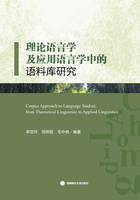
Reexamination of English Static Verbs Used in the Progressive Aspect: A Corpus Approach
Southwestern University of Finance and Economics
Abstract:In traditional grammar, the static verbs are not supposed to be used in the progressive aspect. However, using the static verbs in the progressive aspect in daily life is actually a relatively common phenomenon, which is lack of empirical and compelling research. In order to bridge that gap, this article studies how static verbs are used in the progressive aspect functionally with the corpus-based approach. Eight hundred samples containing static verbs used in the progressive aspect from the Corpus of Contemporary American English(COCA)are selected depending on the frequency of occurrence, analyzed speakers' intention and explored the textual context. The results find static verbs could be used in the progressive aspect in sentences based on certain specific requirements and there are five functions of static verbs used in the progressive aspect among which the function“snapping a shot of the action”has a relatively higher acceptability among native speakers. It is also found that different subtypes of static verbs reflect different tendencies associated with functions of static verbs used in the progressive aspect. These findings may offer researchers some useful information to investigate why static verbs might be able to be used in the progressive aspect and new insights for studying the relationship between subtypes of static verbs and functions of static verbs used in the progressive aspect in the future.
Keywords:Static Verbs; Progressive Aspect; Corpus-Based Approach; COCA
1. Introduction
Verbs are the most basic building blocks for constituting English sentences and the main focus of traditional grammar teaching for a long time. From the perspective of the lexical meaning, English verbs could be divided into two classes:dynamic verbs and static verbs(Quirk, Leech,&Svartvik,1985). Besides the lexical meaning, there is also a difference of usage between static verbs and dynamic verbs. It is generally believed that, static verbs are not supposed to be used in English progressive aspect from the viewpoint of the traditional grammar.
But using the static verbs in the progressive aspect in the daily life is a common phenomenon as exemplified by the data form the COCA.13 out of the top 100 word groups which consist of the lemma be and a verb ending in-ing, ranked by the frequency of occurrence, contain the static verbs in the COCA. This fact indicates the phenomenon is not rare and worth exploring as well as further study.
A number of researchers also exerted their efforts to figure out the causes and classify this grammatical phenomenon on the basis of the pragmatic function. Among them, Mair (2006)argued this phenomenon was an occasional case breaking rules for specific communicative needs within an acceptable range of context after analyzing a series of spoken texts. Moreover, Johannsdottir(2011)investigated the aspect of the progressive in English and Icelandic and demonstrated no any certain link between the classification and the grammatical categories of the English verbs.
However, the previous studies were mostly semantics-oriented with the focus upon the grammar rules. Furthermore, few studies approached the static verbs used in the progressive aspect with the corpus analysis method. These articles which studied the English static verbs used in the progressive aspect could not avoid the influence of human subjectivity. And the examples used in previous articles to verify the feasibility of using the static verbs in the progressive aspect were not been marked with any reference sources, which remains questionable.
To fill these research gaps, this essay would analyze the semantic meaning of static verbs used in the progressive aspect and probe into the reasons behind this phenomenon. A corpusbased analysis has an edge over other qualitative analysis for it could deal with the texts which occur naturally are written or spoken by the native speakers in a more objective way. Therefore, this study would adopt the corpus-based approach to investigate English static verbs used in the progressive aspect and collect data from the COCA. More specifically, more representative and common static verbs would be studied in this research for the sake of a deeper understanding of static verbs used in the progressive aspect. In doing so, this study could address this research question:How are the static verbs used in the progressive aspect functionally?